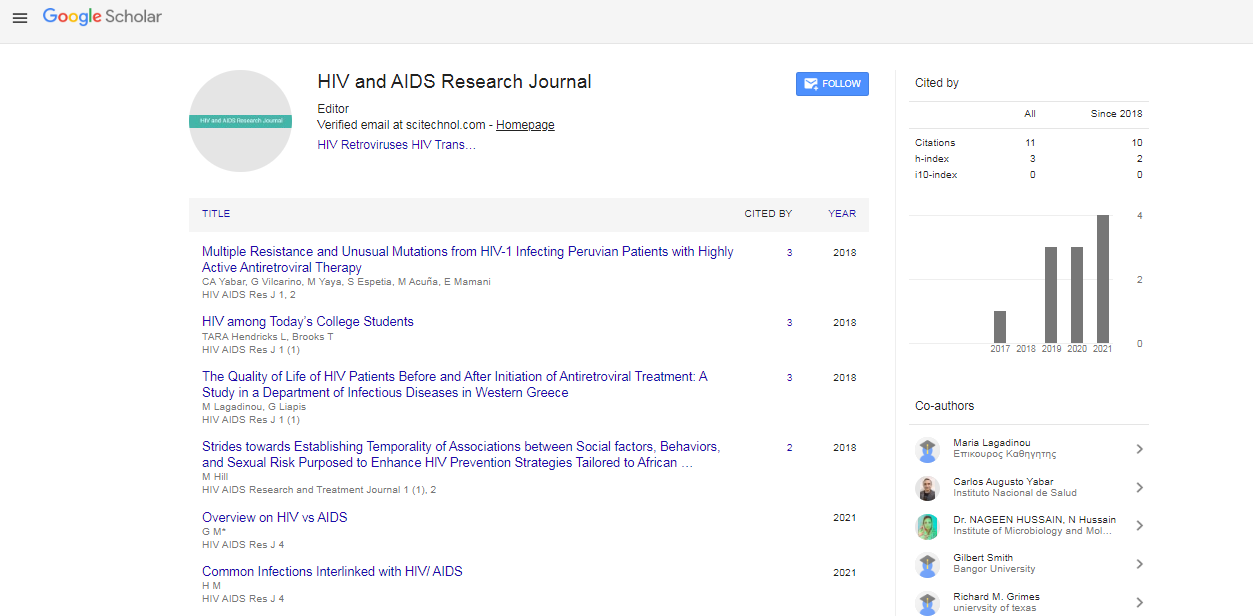Opinion Article, Hiv Aids Res J Vol: 6 Issue: 4
Innovative Avenues in HIV Vaccine Research: Insights and Imperatives
Andrew Richards*
1Department of Virology, Tehran University of Medical Sciences, Tehran, Iran
*Corresponding Author: Andrew Richards,
Department of Virology, Tehran
University of Medical Sciences, Tehran, Iran
E-mail: richard.andrew@uni.edu.ir
Received date: 04 December, 2023, Manuscript No. HARJ-24-124130;
Editor assigned date: 06 December, 2023, PreQC No. HARJ-24-124130 (PQ);
Reviewed date: 20 December, 2023, QC No. HARJ-24-124130;
Revised date: 28 December, 2023, Manuscript No. HARJ-24-124130 (R);
Published date: 05 January, 2024 DOI: 10.4172/Harj.1000137
Citation: Richards A (2024) Innovative Avenues in HIV Vaccine Research: Insights and Imperatives. HIV AIDS Res J 6:4.
Description
Despite significant strides in HIV treatment and prevention, the development of a preventive vaccine against Human Immunodeficiency Virus (HIV) remains a critical goal in curbing the global HIV/AIDS epidemic. HIV's ability to mutate rapidly, its diverse strains, and the complexity of its interactions with the immune system pose formidable challenges in vaccine development. Traditional vaccine strategies, which typically use weakened or inactivated forms of a pathogen, have encountered hurdles due to the elusive nature of HIV and its evasion of the immune response. Developing an effective HIV vaccine necessitates inducing robust and durable immune responses that can neutralize a wide array of viral strains.
Approaches to HIV vaccine development
Scientists have explored various strategies to develop an HIV vaccine, including:
Protein-based vaccines: These vaccines involve using viral proteins or synthetic mimics to stimulate the immune system. Efforts have focused on the envelope glycoprotein due to its role in viral entry.
Vector-based vaccines: Viral vectors, such as adenoviruses or modified poxviruses, are engineered to carry HIV genes into the body, eliciting an immune response against the virus.
DNA vaccines: DNA-based vaccines deliver genetic material encoding HIV proteins into cells, stimulating both cellular and humoral immune responses.
Mosaic vaccines: These vaccines present a combination of sequences from various HIV strains to induce broader immune responses against diverse viral variants.
Recent advances in HIV vaccine research
Recent advancements have provided promising insights into the potential efficacy of HIV vaccines:
HVTN 702 trial: This phase III trial in South Africa aimed to assess the efficacy of a vaccine regimen involving a modified canarypox vector combined with a protein boost. Although the trial did not show overall efficacy, it offered valuable data for future vaccine designs.
mRNA vaccines: Emerging mRNA vaccine technology has shown potential in generating robust immune responses against HIV antigens, presenting a promising avenue for further exploration.
Broadly neutralizing antibodies: Isolation and characterization of broadly neutralizing antibodies capable of neutralizing diverse HIV strains have inspired efforts to design vaccines that can elicit similar antibody responses.
Challenges and future directions
Numerous challenges persist in HIV vaccine development, including the complexity of the virus, the need for inducing broadly protective immunity, and the absence of a definitive correlate of protection. Overcoming these hurdles requires sustained research investment, collaboration, and innovative approaches, such as harnessing new technologies and understanding immune correlates of protection.
Impact of an effective HIV vaccine
The development of an effective HIV vaccine would revolutionize HIV/AIDS prevention strategies by providing a cost-effective, scalable intervention. A vaccine capable of inducing durable protection against HIV acquisition would significantly reduce new infections globally, particularly in regions heavily burdened by the epidemic.
Conclusion
The journey towards developing an effective HIV vaccine has been marked by challenges, setbacks, and significant scientific advancements. While hurdles persist, recent progress and innovative approaches offer hope for the eventual development of a successful vaccine. Continued investment in research, collaboration among scientists, and engagement with affected communities are crucial in the pursuit of an HIV vaccine that could transform the trajectory of the global HIV/AIDS pandemic.
 Spanish
Spanish  Chinese
Chinese  Russian
Russian  German
German  French
French  Japanese
Japanese  Portuguese
Portuguese  Hindi
Hindi 